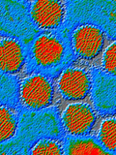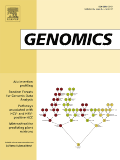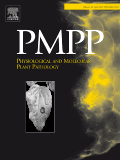
Microbial Genomics
Scope & Guideline
Shaping the Future of Microbial Research
Introduction
Aims and Scopes
- Genomic Epidemiology:
The journal emphasizes genomic epidemiology studies that investigate the relationships between microbial genomes and their epidemiological trends, helping to track outbreaks and understand transmission dynamics. - Pathogen Genomics:
A core focus is on the genomic characterization of pathogenic microorganisms, including their virulence factors, resistance genes, and evolutionary adaptations. - Metagenomics:
The application of metagenomic techniques to explore microbial communities in various environments, including clinical and environmental samples, is a key area of research. - Comparative Genomics:
Comparative studies among different strains or species to understand genetic diversity, evolutionary relationships, and functional capabilities of microorganisms. - Antimicrobial Resistance:
Research on the genomic basis of antimicrobial resistance, including the mobilization of resistance genes and their implications for public health. - Microbial Interactions:
Studies that elucidate the interactions between microorganisms and their hosts or environments, providing insights into symbiosis, pathogenicity, and ecological dynamics. - Bioinformatics and Computational Genomics:
The journal promotes the development and application of bioinformatics tools and methodologies for analyzing genomic data, enhancing our understanding of microbial genetics.
Trending and Emerging
- Long-Read Sequencing Applications:
The adoption of long-read sequencing technologies is increasing, allowing for more accurate genome assemblies and the study of complex genomic regions, including structural variations and plasmid dynamics. - One Health Approach:
Research that integrates human, animal, and environmental health perspectives is gaining traction, emphasizing the interconnectedness of microbial ecosystems and their implications for public health. - Functional Genomics:
There is a rise in studies focused on functional genomics, exploring the roles of specific genes and gene clusters in microbial behavior, pathogenicity, and resistance. - Microbiome Studies:
Investigation into the human and environmental microbiomes is increasingly popular, particularly studies exploring the microbiome's role in health, disease, and therapeutic interventions. - AI and Machine Learning in Genomics:
The integration of artificial intelligence and machine learning techniques for data analysis in genomic studies is emerging, enhancing predictive modeling and genomic surveillance capabilities. - Plasmid Biology:
Research on plasmids, their roles in gene transfer, and their implications for resistance and pathogenicity is becoming increasingly relevant in the field of microbial genomics.
Declining or Waning
- Traditional Culture-Based Studies:
There is a noticeable decline in studies relying solely on traditional culture methods, as genomic and metagenomic approaches become more favored for their ability to capture a broader diversity of microbial life. - Single-Locus Typing Techniques:
Methods like MLST (multilocus sequence typing) are becoming less common as researchers shift towards whole-genome sequencing for more comprehensive insights into microbial relationships. - Static Microbial Diversity Assessments:
Research focusing solely on static assessments of microbial diversity without considering dynamic interactions and functional roles in ecosystems is waning. - Non-Genomic Approaches to Resistance Studies:
Research that does not incorporate genomic data to analyze antimicrobial resistance mechanisms is becoming less relevant in the context of advanced genomic methodologies.
Similar Journals

RESEARCH IN MICROBIOLOGY
Advancing the frontiers of microbiological research.Research in Microbiology, published by Elsevier, is a prominent academic journal devoted to advancing the field of microbiology, encompassing a diverse array of topics including immunology, molecular biology, and biochemistry. Established in 1987, the journal has expanded its focus over the years, with a commendable impact factor reflecting its relevance and influence in the scientific community. Although it does not currently offer open access options, Research in Microbiology remains a crucial resource for researchers and professionals seeking to stay abreast of the latest findings and methodologies. The journal holds a respectable Q2 ranking in Medicine (miscellaneous) and a Q3 ranking in both Microbiology and Molecular Biology for 2023, highlighting its position within the scholarly landscape. With its base in France and accessible to a global audience, Research in Microbiology continues to foster scholarly exchange, making it an essential platform for the dissemination of impactful microbiological research.

Annual Review of Microbiology
Synthesis of Knowledge: Your Gateway to Microbial DiscoveriesAnnual Review of Microbiology is a preeminent academic journal published by Annual Reviews, specializing in the dynamic field of microbiology. With a rich history dating back to 1948, this journal has become a vital resource for researchers, professionals, and students alike, providing comprehensive reviews that synthesize the latest advancements and trends in microbiological research. The journal is renowned for its impressive reputation, holding a Q1 ranking in both Medicine (miscellaneous) and Microbiology, and achieving an outstanding Scopus rank of #12 out of 182 in the field, placing it in the 93rd percentile. Although it does not offer open access, the Annual Review of Microbiology remains integral to advancing knowledge and understanding of microbial science, helping to bridge the gap between fundamental research and practical applications in health, industry, and environmental sustainability. Its meticulously curated content serves as a crucial platform for fostering innovation and collaboration among the global research community.

ARCHIVES OF MICROBIOLOGY
Advancing the Frontiers of Microbial ScienceThe Archives of Microbiology, published by Springer, is a reputable journal in the field of microbiology, serving as a vital platform for the dissemination of groundbreaking research and critical reviews since its inception in 1974. With an ISSN of 0302-8933 and an E-ISSN of 1432-072X, this journal operates out of Germany and maintains a global reach, promoting high-quality scholarship across multiple disciplines, including biochemistry, genetics, and molecular biology, as evidenced by its Q2 ranking in Medicine (miscellaneous) and consistent Q3 placements in other categories in 2023. Although the journal does not offer open access options, its rigorous peer-review process ensures that published articles are of the highest standard, making it an essential resource for researchers, professionals, and students keen on advancing their understanding of microbial sciences. As the journal converges toward 2024, it remains committed to fostering innovative microbiological research and facilitating interdisciplinary dialogue within the scientific community.

Microbial Physiology
Innovating Insights in Microbial PhysiologyMicrobial Physiology is a premier, peer-reviewed journal published by KARGER, dedicated to advancing the field of microbiology through innovative research and reviews. With an ISSN of 2673-1665 and an E-ISSN of 2673-1673, the journal stands out in the academic landscape having established a strong track record since its inception in 2020, converging its scope until 2024. It proudly holds a Q2 category ranking in several key areas including Applied Microbiology and Biotechnology, Biochemistry, and Microbiology, making it an essential resource for researchers and professionals in these disciplines. The journal provides open access options to ensure that cutting-edge findings are widely disseminated, fostering collaboration and knowledge sharing. As a vital contributor to the ongoing discourse in microbial physiology, the journal serves as a platform for novel discoveries and methodologies that can significantly impact health, industry, and environmental sustainability. Located in Basel, Switzerland, it brings together a global community of scholars eager to further explore the complexities of microbial life.

G3-Genes Genomes Genetics
Advancing the Frontiers of Genetic ResearchG3-Genes Genomes Genetics is a prominent open access journal published by Oxford University Press, Inc., dedicated to advancing the field of genetics and genomics. Since its inception in 2011, the journal has become a vital resource for researchers, professionals, and students, featuring high-quality, peer-reviewed articles that cover a broad spectrum of topics within genetics, including clinical genetics and molecular biology. With an impressive standing reflected in its 2023 Scopus rankings, which positions it in the Q2 category for Genetics (Clinical) and Q1 for Medicine (Miscellaneous), G3 remains at the forefront of scholarly communication in these disciplines. The journal's commitment to open access ensures that cutting-edge research is accessible to a global audience, stimulating collaboration and innovation in the field. For those eager to explore the latest in genetic research, G3 serves as an indispensable platform, inviting contributions that push the boundaries of scientific understanding.

GENOMICS
Illuminating the Path of Genetic InnovationGENOMICS is a prestigious journal published by Academic Press Inc Elsevier Science, dedicated to advancing the field of genetic research and molecular biology. With an impressive impact factor, this journal is recognized for its rigorous peer-review process and high-quality publications that cover a wide range of topics within the genomics discipline. Operating from the United States, GENOMICS has established itself as a vital resource for researchers, professionals, and students alike, standing at Q2 in the Genetics category according to the latest rankings. With a rich history dating back to 1987 and convergence extending to 2024, the journal highlights cutting-edge discoveries and methodologies, ensuring that its readership remains at the forefront of genetic advancements. Although currently not an open-access journal, articles published within its pages are often accessible through various academic platforms, enhancing worldwide reach and dissemination. For those engaged in the fields of biochemistry, genetics, and molecular biology, GENOMICS serves as an indispensable platform for impactful research and collaborative initiatives.

INFECTION GENETICS AND EVOLUTION
Unlocking the Secrets of Infection and AdaptationINFECTION GENETICS AND EVOLUTION is a premier scholarly journal published by Elsevier, focusing on the dynamic field of infection genetics and evolutionary biology. Since its inception in 2001, this journal has emerged as a critical platform for the dissemination of cutting-edge research, bridging the gap between molecular genetics, evolutionary theory, and infectious disease study. With an influence profound enough to secure its status in the Q1 category for Ecology, Evolution, Behavior and Systematics and impressive Q2 rankings in Genetics, Infectious Diseases, and Microbiology, the journal offers researchers unparalleled insights that advance the understanding of pathogen evolution and host interactions. Despite the lack of Open Access, the research published in this journal significantly contributes to the academic discourse and informs public health approaches. By publishing high-quality studies and reviews through 2024, INFECTION GENETICS AND EVOLUTION remains indispensable for academics, professionals, and students seeking to explore the intricate mechanisms of infection and adaptation in various organisms.

PHYSIOLOGICAL AND MOLECULAR PLANT PATHOLOGY
Unlocking the secrets of plant health and resilience.Physiological and Molecular Plant Pathology is a leading journal published by Academic Press Ltd - Elsevier Science Ltd, dedicated to advancing our understanding of plant diseases through the synthesis of physiological and molecular perspectives. With an ISSN of 0885-5765, this esteemed journal has been a cornerstone in the field since its inception in 1986 and continues to publish critical research findings up to 2024. Notably, it holds a strong reputation in Plant Science, ranked Q2, and genetics, ranked Q3, reflecting its impactful contributions to these important areas of study. The journal is recognized within Scopus, achieving a ranking of 151 out of 516 in Plant Science, positioning it within the 70th percentile, making it a vital resource for researchers and students alike. While it is not an open-access journal, the insights provided in each issue are invaluable for those dedicated to understanding the complexities of plant pathology and enhancing agricultural resilience. Researchers, professionals, and students in the field are encouraged to explore and contribute to this pivotal journal, which plays a crucial role in driving innovation and discovery in plant health sciences.

Lancet Microbe
Fostering Collaboration for a Healthier TomorrowThe Lancet Microbe is a leading peer-reviewed journal published by ELSEVIER, focused on advancing research in the fields of infectious diseases, microbiology, and virology. Since its inception in 2020, this open-access journal has rapidly achieved a prestigious reputation, evidenced by its impressive rankings in the Scopus Ranks, where it holds positions within the top 10 in multiple categories and boasts high percentiles, reflecting the impact and relevance of its published works. With a quarterly publication schedule, the Lancet Microbe aims to disseminate critical findings and foster innovation within the scientific community, providing a platform for researchers and professionals to share their significant contributions. The journal is committed to facilitating knowledge exchange and accessibility, making it an essential resource for academicians and practitioners dedicated to addressing global health challenges.

CANADIAN JOURNAL OF MICROBIOLOGY
Unveiling Breakthroughs in MicrobiologyThe Canadian Journal of Microbiology, published by Canadian Science Publishing, is a well-respected journal established in 1954 that serves as a vital platform for advancing knowledge in the fields of microbiology and related disciplines. With an ISSN of 0008-4166 and an E-ISSN of 1480-3275, this journal is recognized for its rigorous peer-review process and its commitment to disseminating high-quality research that spans applied microbiology, biotechnology, genetics, immunology, and more. Currently indexed in several prestigious databases, its impact factor and category quartiles highlight its significance, ranking in the top tiers of applied microbiology and biotechnology as well as other intersecting fields. The journal provides an essential resource for researchers, professionals, and students seeking to stay informed on the latest advancements and breakthroughs, facilitating collaboration and innovation in the microbiological sciences. Set in the dynamic landscape of academia from its headquarters in Ottawa, Canada, the Canadian Journal of Microbiology remains steadfast in its mission to promote research that addresses key challenges and opportunities within the microbiological community.